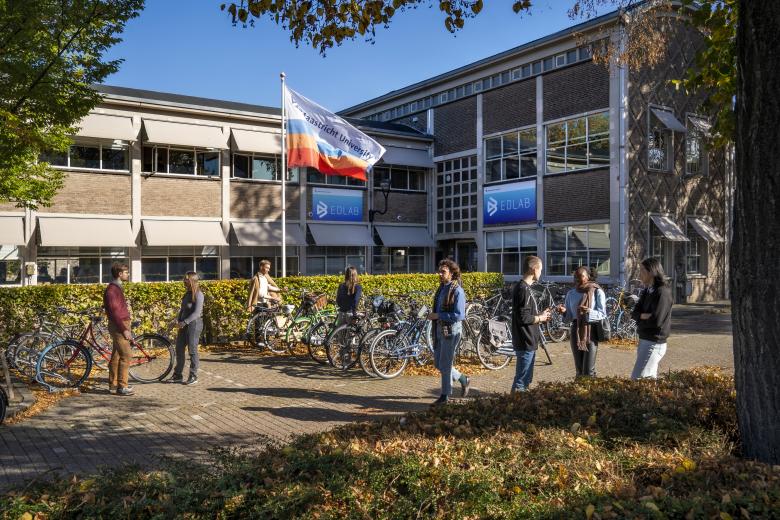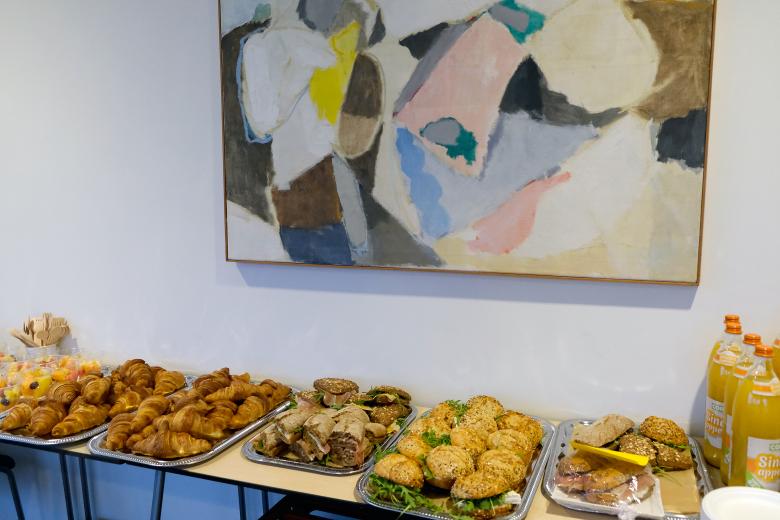UM Education Days 2023
The UM Education Days are back!
Assessment, tutoring, advising, technology, inclusivity, feedback, educational design, and much more! Once again, the Maastricht University Teaching & Learning community will exchange, share, learn, discuss and enjoy all things education at EDLAB on 7 and 8 June 2023!
Teaching is Learning, Learning is Teaching
The UM community of teachers and learners is vibrant, diverse, and full of creative and innovative ideas and initiatives. To bring all this creativity and dedication together, EDLAB organises UM Education Days revolving around the awareness that Teaching & Learning go hand in hand.
"The UM Education Days gave me time to reflect – this should be done more often!"
UM Education Days 2022 participant
Programme UM Education Days 2023 - Day 1
Sessions Round 1 - 10:30-12:00
- Session 1.1: [Cancelled] I don’t feel gifted…everyone can do this, right?’ An interactive lecture about the importance of recognising giftedness by Anke Smeenk
Many gifted students don’t feel gifted. They have thoughts like: - ‘Yes, I can do this, but everyone can do this, right?’ - ‘There is so much I don’t know.’ - ‘If I were gifted, I wouldn’t struggle so much with my studies/work.’ During this session, we will first dive a little deeper into what giftedness is, as the word ‘giftedness’ often has a negative connotation in society. Giftedness in everyday life is often not just about having good cognitive abilities or a high IQ. It involves a range of characteristics, including sensitivity, doubt, and setting (too) high expectations. These characteristics may add an extra layer of complexity to seemingly ‘normal’ problems, leading to lower self-confidence, procrastination, and lagging results. Second, we will address potential pitfalls in case the student does not recognise or acknowledge giftedness. The goal of this interactive session is to offer an alternative framework for thinking about giftedness and to provide insight into the pitfalls in case giftedness is not acknowledged by the student.
- Session 1.2: If Advising is teaching, what do Advisers teach? Developing Student Learning Outcomes for advising at a CCCS University by Iris Burks & Oscar van den Wijngaard
Over the past few years, UM has strongly invested in student guidance through central employability and wellbeing programmes, as well as faculty-based mentoring and student advising programmes. Connecting the various objectives of these initiatives, a shared vision on advising is emerging that combines caring with learning, and revolves around the idea of helping students develop a stronger sense of agency. This resonates strongly with the global trend of thinking about advising in terms of student learning outcomes. In that context, parallels with teaching are often drawn. During this session, we will explore how the emerging UM vision on advising can be operationalised into to actionable student learning objectives that fit your specific educational and advising/mentoring programme. This session will be relevant for student advisers, mentors, mentor coordinators and programme directors.
- Session 1.3: Master Thesis Supervision by Therese Grohnert & Lena Gromotka
Master’s thesis supervisors play an important role in teaching advanced students the knowledge and skills necessary to complete a research project. Supervisors are critical for student success in higher education. However, master’s thesis supervision can be a challenging task that requires a unique set of skills and knowledge, and often, these skills are not explicitly taught to new supervisors. This workshop, therefore, has two goals: 1. Sharing insights from a systematic literature review on best practices in master thesis supervision from around the world. 2. Offering intervision for new and experienced supervisors to exchange practises and experiences of master’s thesis supervision at UM. Together, we will explore key challenges and issues related to master’s thesis supervision, learn about good practices and share helpful tools that support you as a supervisor. We look forward to meeting you during the UM Education Days!
- Session 1.4: Creative workshop: Moss-map your education! by Burak Can
Join us for an exciting workshop where you can explore the power of nature and creativity! In this hands-on experience, you will use live moss and wooden or 3D-printed frames to create a beautiful green wall mindmap that visualises a challenge in your studies or work. Not only will you learn about the benefits of incorporating living plants into your workspace, but you will also gain insight into innovative visual thinking techniques to help you tackle complex problems. With guidance from our expert instructors, you will create a unique and personalised green wall mindmap that you can proudly display in your workspace as a source of inspiration and motivation. Don't miss this opportunity to unleash your creativity and enhance your problem-solving skills!
- Session 1.5 Testvision by Maartje Hensgens and Lonneke Bevers
In this session, we will provide several ways to align your TestVision exam with the UM vision on assessment. The goal of the workshop is to offer inspiration to design or update your own exams in TestVision. The session is exclusively aimed at UM lecturers.
NOTE: This session will take place at the Inner City UM Library
Lunch
Exchange your insights from the first session, get to know your colleagues and enjoy lunch.
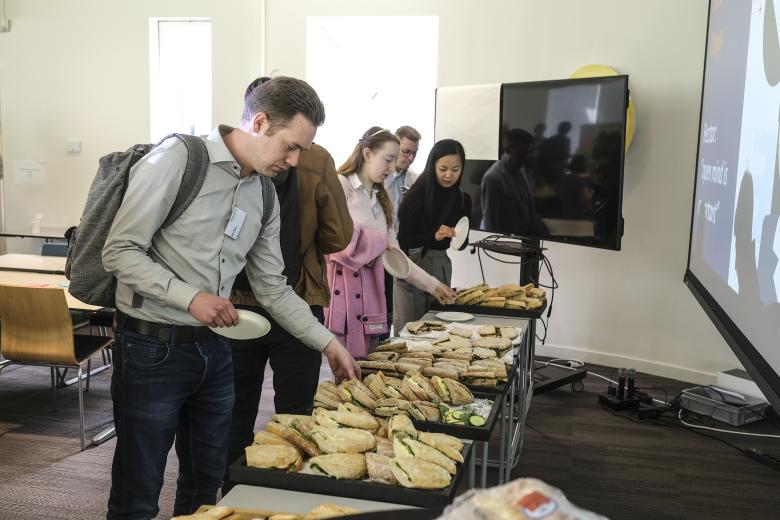
Lights, Camera, Action!
Share your passion for education on video
Use the power of visual media to talk about what motivates and drives you in education. This is a unique opportunity to practise your video communication skills in a short 10-minute session with a professional filming crew. Not only will you contribute to the main UM Education Days 2023 video clip, but you'll also receive your own individual video clip as a bonus.
Grab this chance to record your enthusiasm for education on camera and inspire others. And no worries: we’ll ensure you feel comfortable during filming: no pressure. Sign up now, and we'll provide you with the details!
Maximum number of participants: 10
Filming will take place during the following time slots:
- 12:00-13:00
- 14:30-15:00
- 16:30-18:00
Sessions Round 2 - 13:00-14:30
- Session 2.1: EduGrants
Over the last two years, EDLAB awarded grants to more than 15 projects focusing on education innovations in the PBL classroom. Project topics include a.o. blended learning, feedback, VR in education, new media & education, PBL problems and creativity. During this session, previous grant winners will showcase results, products and innovations whereas more recent grant winners will introduce their projects to you and respond to any questions and ideas you may have. Have a look at these short videos of current and previous EDLAB grant projects.
- Session 2.2: Supporting self-regulated learning: What do we know and where do we go? by Anique de Bruin & Lena Gromotka
Among the many competences that higher education seeks to nurture in its students, the ability to plan, monitor, and regulate their own learning is increasing rapidly in priority. These self-regulated learning (SRL) skills are known to predict later life satisfaction and wellbeing, and are essential in adapting to a continuously changing workforce. How to design education that promotes students’ SRL skills while preventing more box-ticking and without adding to an already challenging workload is the central question of the SRL EDLAB Innovation project. We combined a systematic review study with focus group discussions with teachers from all UM faculties, with the aim to bridge empirical evidence and teachers’ and students’ experiences, opinions, and needs. During this workshop we will (1) share the projects’ first results, (2) ask for participants’ reflections, and (3) interactively discuss in small groups how to build on these findings to improve SRL skills in our students.
- Session 2.3: Diversity & Inclusion: PBL and UDL by Ophélie Hue
Where UDL meets PBL – a match made in heaven, or a pairing from hell? Where does Universal Design for Learning (UDL) go hand in hand with PBL, and where might it clash? In this workshop, we will briefly introduce you to UDL and we will then dissect where and how this intersects with PBL and the UM educational model, and where challenges might arise. (Warning – this workshop may cause you to consider some new and exciting ways to approach your tutorial sessions and teaching!)
- Session 2.4: We need to talk about teaching (careers) by Therese Grohnert, Roy Erkens, and Matthijs Krooi
In order to truly recognise and reward education as a meaningful activity pursued by academics, we need to become better at talking about our performance as educators. During this interactive session, we will explore different perspectives on what it means to provide quality education. For instance, how can you show that you are a good teacher? What quantitative and qualitative information do supervisors need to base decisions on in a responsible manner? How can the organisation facilitate the evaluation and assessment of teaching quality?
By participating, you will contribute to the ongoing discussion at Maastricht University regarding Recognition and Reward of education.
- Session 2.5: From self-evaluation to self-improvement: how to master self-assessment in higher education by Laurie Delnoij
As a student, do you sometimes feel a lack of control in your learning process and not making the progress you would like to? As a teacher, do you sometimes feel students to be overestimating their abilities, mostly revisiting the study material they already master but not taking the necessary steps to improve? In this workshop, we will be diving into the world of self-assessment and exploring how it can help students and teachers in higher education. Self-assessment is invaluable for lifelong learning in which one collects and evaluates information about their own progress, pinpoints areas for improvement and charts a course for success. In this workshop, we will discuss a range of techniques for self-assessment from practice testing to students generating their own feedback. As self-assessment will not develop on its own we also explore the facilitators and barriers to self-assessment and conditions for effective implementation.
- Session 2.6: Getting Groups on Track by Team Focus. Group work can be a valuable experience for students, helping them to gain new skills and learn from each other. For teaching staff, however, it can sometimes be challenging to keep track of what is happening and facilitate the process in the best way to get the most out of the group. In this workshop, we will discuss how to empower groups to work independently and to stay on task, whilst retaining a clear overview of the process. This training session focuses specifically on facilitating effective group dynamics in project teams, and tutorial groups. We will be working on questions like: how can I ensure that the group members quickly connect with each other? How can I work on trust within a group, so that more openness and involvement arise? What do I do if the group is not functioning well? Team Focus is known for its experiential learning approach, which makes every session very insightful and meaningful but also a lot of fun. This session takes place on the grounds of Tapijn.
Sessions Round 3 - 15:00-16:30
- Session 3.1: Sense-based Education by Emilie Sitzia
Senses-based Learning is a pedagogical methodology for tertiary education focusing on exploring and developing sensory skills and critically reflecting on their importance in research and professional practice. After a year and a half of working on the 'Senses-based Learning' project, the team is ready to share our first results! During this 90 minutes workshop, we will first share what we found in our classroom experiments, expert interviews and literature research. We will share key senses-based learning design principles and typology of exercises to help you reintegrate the senses in your own teaching and come up with your own activities. To give you a concrete idea of how this works in classrooms, we will also experiment with two exercises we used with students to develop communication around the senses and to understand how disciplinary protocols impact on sensory data collection.
- Session 3.2: Training good feedback techniques by John Harbord
Although research shows that peer feedback can be as effective as tutor feedback, student perceptions of its value are often low, with most considering it a ‘poor second best’ to comments from a tutor. The main reason for this is that without a guiding framework, students often do not give the most helpful comments they could give, and when they receive feedback, whether from tutors or peers, they are not well-trained to make use of it. In this workshop, I suggest ways and options for training students to make the best use of feedback opportunities through a structured approach to both giving and using peer comments.
- Session 3.3: You can't brainstorm a formula by Martijn Boussé and Anna Zseleva
The UM vision on education features problem-based learning (PBL) in which students form small groups to discuss real-life cases by activating prior knowledge, connecting new information, structuring ideas and critically evaluating their findings, while collaborating with peers and being supported by tutors. How does this approach translate to math courses, in practice? Can we even apply PBL in our math courses? And if not, why not? Several lecturers experiment with various practices across UM, while others question the very possibility. In this two-part session, we try to find answers to these difficult questions. Preceded by a panel discussion between lecturers and students who have worked with PBL in various math courses, participants will engage in collaborative explorations on the applicability of CCCS principles for teaching math.
- Session 3.4: Automated feedback interventions by Leon Winz
AI applications providing automated feedback for written assignments have been heralded as promising avenues to increase student autonomy, enabling a more flexible educational journey. Still, the success factors for adoption and implementation in higher education remain unknown. A project group at SBE has developed a tool analysing quantifiable text-quality KPIs and integrating an interface to ChatGPT, creating individualised recommendations for improvement. The aim of the project “Reality Check: automated student feedback at SBE”, run by Lecturer Leon Winz & PhD candidate Eric Schaap is to investigate the effects of the text analysis tool on student’s learning outcomes, students’ engagement with the technology-enhanced feedback offerings, and the concerns students may have with feedback interventions orchestrated by an AI entity. Participants of the workshop will receive a short demonstration of the tool, followed by a hands-on experience session and a discussion about use-case possibilities and potential benefits and concerns towards implementation from the students’ and educators’ perspectives.
- Session 3.5: Charters, contracts, constitutions: students setting their rules of engagement by Valentina Mazzucato, Annemarie van Zeijl-Rozema, Niels van der Baan & Bas Giesbers
In several programmes at UM, at the start of the academic year, semester or course students begin by discussing how they want to shape their tutorial group or cohort into an engaged and committed community of learners. Together, they formulate their own code of conduct, the expectations they may have of one another, and agree to honour those resolutions as if they were a contract or a constitution. In this session staff (and students?) who have experimented and worked with this approach share their experiences: their initial expectations and intentions, how they developed the particular format they used, and the actual impact they felt it had on how staff and student functioned as a social and academic community. There will be ample room for discussion in this session, and participants will come away with ideas on how to promote a sense of social and academic belonging in their own educational context.
- Session 3.6: How to motivate students by Team Focus
In this workshop, we will discuss how people are motivated and how you can use this to facilitate an environment in which students learn and grow. With a focus on group work and group learning, we will work on questions like: what different kinds of motivations are there? How to adapt your teaching style to foster growth in students? How to create an environment that helps students to learn and grow? Team Focus is known for its experiential learning approach, which makes every session very insightful and meaningful but also a lot of fun. This session takes place on the grounds of Tapijn.
Drinks
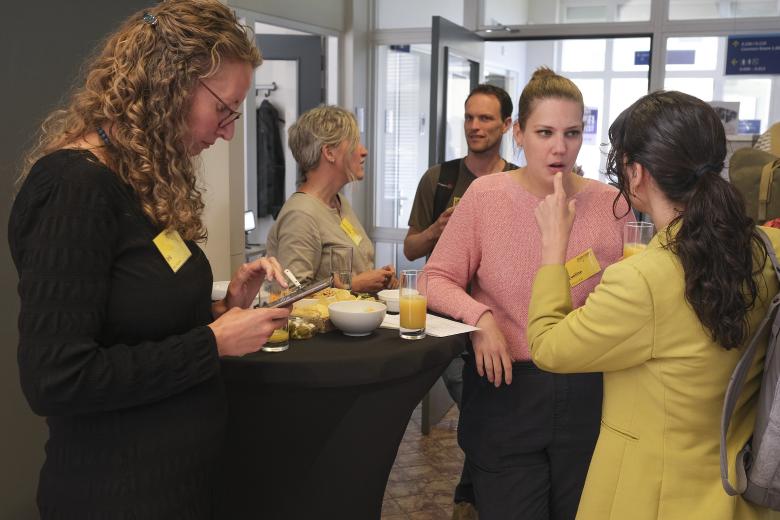
Programme UM Education Days 2023 - Day 2
Sessions Round 4 - 10:00-11:30
- Session 4.1: Community of Practice - Blended Learning by Hans Savelberg, Annechien Deelman & other CoP members
In the spring of 2022, the Community of Practice on Blended Redesign started. Three teams dived into different aspects of blended education. One of the teams set out to gain insights into the ideas, experiences and needs of FHML students regarding blended learning. The second group focused on the use of blended learning to support student learning before going to the tutorial session. They collected various examples and experiences of flipped-classroom models and brought them together in a teaching-materials repository and interview-series podcast. The third team raised the question of why anything ‘blended’ is popular, and wondered whether the focus should not rather be on learning content and principles than on form aspects like either or not ‘being blended’. During the session, we will take you in an interactive way along the findings on these three topics.
- Session 4.2: Purposeful Portfolios by Gaby Lutgens, Iris Burks, Lonneke Bevers, Ilse Sistermans, Aggie Paulus & Oscar van den Wijngaard
Competency development, meta-cognition, and reflection are increasingly recognised as essential components of higher education - sometimes woven into the academic curriculum, sometimes supported through adjacent interventions like academic advising or mentoring. Portfolios can be powerful tools for attaining these outcomes. Currently, a joint SURF tender process, including ten Dutch universities, is underway, and at UM all faculties are using, piloting, or considering various platforms and applications. In this interactive session, we will provide examples from UM practice, along with relevant theories on competency development and advising as input for a discussion on issues such as: what are meaningful goals for using portfolios that motivate and engage students? What are the appropriate forms of assessment? Can portfolios be aligned with other aspects of the student’s learning experience? How does the use of a portfolio affect educational design and assessment?
- Session 4.3: Tutors: Workshop teaching-research integration by Patrick Bijsmans & Sally Wyatt
The way in which curricula are designed means that we are not always able to teach subjects that exactly fit our research expertise. Our commitment to interdisciplinarity in teaching and research and to PBL as our educational philosophy is very persuasive reasons for this. Yet, some of us may not find this situation ideal. In this workshop, we will explore alternative ways in which research can benefit from your teaching, going beyond the model of teaching your own research to a group of highly motivated, advanced students. We will take a hands-on approach by exchanging ideas and discussing real-life examples. Prior to the workshop, you will be asked to complete a short survey that will serve as input for our discussions. For a hint about what we might be discussing, you can read this post on the FASoS Teaching & Learning Blog.
- Session 4.4 Co-creation by Karen Konings & Lena Gromotka
The importance of involving students as co-creators in educational design is ever more recognised. Benefits for students include co-ownership and empowerment, while for staff it contributes to professional development. Additionally, the development of a quality culture convincingly indicates a need for change that moves beyond student representation only. But how can we meaningfully engage students in co-creating education? In this workshop, we will elaborate on why it might be challenging to change traditional educational design practices, both for staff and for students. And, we will discuss possible approaches to start co-creation initiatives in your own practice. What are your educational design goals? Which students do you invite and how many? What co-design activities are you going to organise and how do you involve students in the whole educational design cycle? What do you do if students are not willing to contribute to co-creation? And, how do you ensure inclusivity in your project? We will share effective practices from our own projects to inspire the audience and stimulate further discussion, before closing with an overview of tips and tricks for the co-creation of education.
- Session 4.5 From Self-Assessment to Co-Grading: A Report and Workshop on Designing Self-Directed Assessment by Jacob Ward
A core tenet of education at UM is that learning works best when self-directed. At the moment, self-directed education mostly takes place in learning activities in the classroom. But what if you extended that to assessment as well? Educational research suggests that self-assessment is one of the most powerful forces for learning in higher education (Hattie, 2009). So what would self-assessment at UM look like? How can self-assessment work, both pedagogically, but also practically? This session explores the benefits of self-assessment for students and staff. It starts with a report from a two-year trial of self-assessment on a second-year course in the BA Arts and Culture at the Faculty of Arts and Social Sciences, and will finish with a workshop where participants can begin to design self-assessment activities for their own teaching.
- Session 4.6: Exploring Open Textbooks in Education by Michel Saive
Open textbooks are free educational resources that offer greater affordability and flexibility for students and teachers. They provide a wealth of resources that can be easily adapted to your own courses, offering more pedagogical freedom for you as an educator. During the workshop, we explore the benefits and challenges of using open textbooks as an alternative to expensive traditional textbooks. You'll learn about the advantages and disadvantages of creating and reusing open textbooks, as well as how to locate existing open textbooks in various databases and search engines. The session will consist of brief instructions and explanations, followed by active assignments that will help you put your knowledge into practice. By the end of the session, you will have the skills to incorporate open textbooks into your teaching practices, enabling you to contribute to a more sustainable and equitable education system.
NOTE: This session will take place at the Inner City UM Library
- Session 4.7: VR-enhanced PBL by Roberta Di Palma & Walter Jansen
It has become relevant for universities to reflect on and engage with accelerated developments in technology that impact education. Virtual Reality (VR) is one of the most prominent contemporary technologies with an almost imminent application to education, training and learning. Together with DEXLab (SBE), EDLAB has launched the project, “VR-enhanced PBL,” in which we look for meaningful ways to integrate VR in the PBL classroom. More specifically, the project pilots two commonly used VR practices in various UM faculties, focusing on 1) training presentation skills in VR and 2) using 360-degree videos to enhance the context and overall learning experience within PBL education. Next to the pilots, the project also engages with research to provide an evidence-informed and nuanced foundation to integrate VR in PBL-CCCS education. During this presentation, Walter Jansen (EDLAB) and Roberta Di Palma (SBE/DEXLab), will share highlights of the project and showcase its main findings.
Sessions Round 5 - 11:45-13:15
- Session 5.1: Learning & Innovation grants: Educational research, from research questions to results to implementation in the classroom, by Taskforce Learning & Innovation
In this workshop, we will dive into the world of educational research. Brace yourselves, you will have to work for, and of course also with, us! In a gallery walk format, the attendees will (literally) move from topic to topic and discuss how certain research results can help us develop better educational activities. We will also think about the type of questions we should research. For this purpose, we will provide a stage for some projects that received seed money through the Learning and Innovation Research grant in 2022, such as how to incorporate Global Citizenship education in international study projects or supporting staff in dealing with diversity among students.
- Session 5.2: Improv(e) your study start!: Fostering students' life skills development with improvisational theatre by Annika Nübold, Alicia Walkowiak & Eliza de Sousa Fernandes Perna
Students' focus on grades and academic performance is strongly driven by societal and economic developments with a strong emphasis on efficiency and excellence. At the same time, students’ intolerance of ambiguity, uncertainty and potential failure have seemingly increased during the past years. Educational approaches across a wide range of disciplines (e.g., management, education, medicine, and psychology) have changed from traditional knowledge transfer to more interactive and experiential approaches to enhance life skills. Complementing study skill education with life skill education has become a key aim of the mentoring programme at the Faculty of Psychology and Neuroscience (FPN) in the past year through the Global Citizenship Education initiative that puts character strengths education and experimental teaching methods, such as improvisation theatre, into the spotlight. In this 90-minute workshop, we will introduce the mentoring programme at FPN and provide you with knowledge and tools on how to guide students through character strength exercises and improvisation theatre exercises. The specific low-threshold exercises are fun and easy to do and are aimed at fostering students’ life skills.
- Session 5.3: Five steps towards familiarizing students with PBL/CCCS by Oscar van den Wijngaard
Under the umbrella of ‘Constructive, Contextual, Collaborative and Self-directed’ learning, UM’s bachelor's and master's programmes employ a wide variety of educational models – and together they serve a student population coming from a range of educational backgrounds. How do we make sure our students can thrive within our particular approaches to teaching and learning? And: can we learn from each other, given the diversity within CCCS? As part of the Quality Agreements, a cross-faculty working group developed a framework for designing and developing activities that help students familiarise themselves with our educational models. In this session, following several short examples from UM faculties, we will use that framework to exchange, explore, and discuss existing and new practices around this critical topic.
- Session 5.4: Putting the Fun in Functional – Growing Motivation for Education by Svea Meier & Lotte Slootmaekers
Are you tutor, a student, or a course coordinator? Do you ever wake up in the morning feeling like you'd rather hit snooze than hit the classroom? Well, teachers, students, and other faculty members alike, we've got just the thing for you! Introducing "Putting the Fun in Functional – Growing Motivation for Education", join us on the adventure of a lifetime! In our gamified workshop, we will storm the dungeons of Disengagement and battle the dragons of No Motivation. You get to take on a role you have never tried before and have to be creative in coming up with solutions for the battles that lure around every corner. Time to don your best wizarding wand and dust off your thinking cap to work together in a team to successfully complete the mission, who knows what riches might be waiting at the finish line! Don't miss out on this opportunity to infuse your brain and your classroom with energy and enthusiasm. Register now for "Putting the Fun in Functional – Growing Motivation for Education" and let's put our heads together to make learning a blast!
- Session 5.5: Workshop on positive health for teaching and student advising staff by Nadine Chudy
After some turbulent times, it is valuable to reflect on our own health and well-being. We will tackle questions such as: Which elements influence health? What is most important to you in life regarding your health and well-being? Thereafter, a translation will be made into practice: how can we as professionals contribute to the resilience and personal and professional development of our students? This training will introduce the basic principles of Positive Health and how to apply these principles in your work with students. The sessions consist of theory, self-reflection and practical exercises. After following this workshop, you are able to: take a broader look at your own health and well-being and of the student; gain insight into the student’s resilience; take on a coaching role when talking with students about resilience and positive health; guide students to further develop their resilience and health; guide students how to take control in dealing with the physical, emotional and social challenges in life.
- Session 5.6 Making Podcasts by Anna-Lena Hoh and Jermain Kaminski
This session will give an introduction on how a scientific podcast can be used as student product instead of or in addition to a traditional research paper. We will start by introducing the theoretical elements and pointers of attention for teachers that want to introduce a scientific podcast in their courses. Jermain Kaminski from SBE will also share his experiences as course coordinator using a scientific podcast as an assessment tool. Finally, we will also show the newly renovated podcast studio of the Inner City Library and maybe even practice recording a podcast!
NOTE: This session will take place at the Inner City UM Library
Wrap-up Lunch - 13:15-14:15
It’s a wrap! The final event for the UM Education Days 2023 combines great food with a moment of reflection and looking forward: what have we heard, what have we learned, and what are we going to do next? How can we nurture a culture of exchange and co-learning within the UM Teaching & Learning community? We are curious to hear your thoughts!
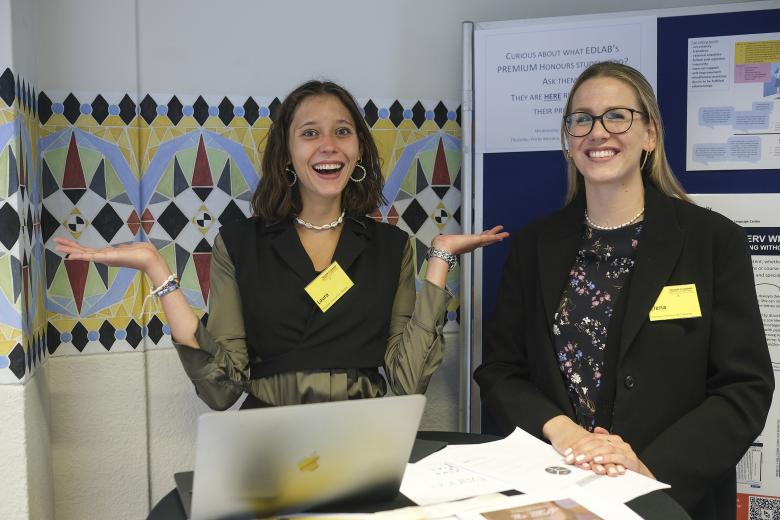
Aftermovie UM education Days 2022
Over 120 members of the UM Teaching & Learning community – teaching staff, support staff and students – from across the university came together at EDLAB for the first edition of UM Education Days on 1-2 June 2022. It was a vibrant event filled with inspiring exchanges on educational practices and perspectives.
